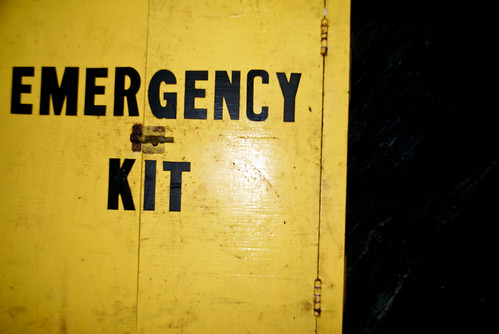When it comes to preparedness, it helps to have a well-stocked medicine cabinet. You want to be ready for unexpected ailments, since there are few things as frustrating as making a run to the store in the middle of the night, trying to find a fever reducer for a sick child. In order to make sure that you are adequately prepared for the minor health issues that are likely to come up. Here are 15 items to keep in your medicine cabinet:
Minor Cuts and Scrapes
You want to be prepared for minor cuts and scrapes, ready to take care of these problems — especially if you have children. Here are some of the essentials for minor cuts and scrapes:
- Bandages: You should make an effort to have different shapes and sizes of bandages. Self-adhesive band-aids are good choices, as are gauze, special tape and other bandages that can be used for other purposes.
- Disinfectant: Be sure to have some sort of disinfectant on hand. Use it to help clean and disinfect small scrapes and minor cuts. Hydrogen peroxide can be a good choice, as it can double as a stain remover. Isopropyl alcohol might also be a good choice, since it can serve as a cleaner.
- Antibacterial Ointment: Some sort of ointment is also a good idea, since it can help with pain relief, and help speed the healing process.
- Q-tips: These are quite helpful for applying medicines, and they can be used for makeup removal and for detailed cleaning, making them quite versatile.
- Tweezers: These can be helpful tools for the removal of splinters and ticks, as well as serving important grooming purposes.
Irritations, Allergies and Rashes
- Allergy Medications: Make sure you have allergy medications that work for you. Know how they affect you (in terms of drowsiness and other side effects). Consider getting generics when you can, since it will help you save money. One of the most important allergy medications you have is Benadryl (or a generic counterpart). This is because it works fast and can reduce hives, or help stave off other allergic reactions.
- Witch Hazel: Witch hazel is a great multi-purpose medicine cabinet addition that can help with acne, reduce rashes, relieve hemorrhoids, sooth irritation from poison ivy and poison oak, and even reduce the bags under your eyes.
- Anti-Fungal: Use an anti-fungal to help treat/prevent athlete’s foot and jock itch.
- Muscle Cream: A good muscle cream can help relieve inflammation, and pain, associated with muscle soreness.
Stomach Problems, Flu and Cold, Headaches and Fever Reducers
- Pain Relievers: Get two types: acetaminophen and a NSAID. Tylenol and similar generics have have acetaminophen, and NSAIDs are Ibuprofen, Motrin, Aleve, Advil and their generics. For inflammatory pain, NSAIDs work better. If you are working to reduce the fever in a child, you should alternate your use of acetaminophen and NSAID.
- Cold and Cough: OTC medications can help relieve different cold and flu symptoms. You can also get some that come with fever reducing pain relievers. If you are looking to clear yourself out, Sudafed can be a good choice (for sinus trouble), as can Mucinex, which is an expectorant that helps you cough productively, loosening the junk and helping you cough it up.
- Antacids: Use these for heartburn. Look for liquid options as well as tablet options.
- Nausea, Motion Sickness and Diarrhea: You can get some stomach relief from a catch-all like Pepto Bismol (and its generics). You can also consider individual items, such as Dramamine for motion sickness and Immodium for diarrhea.
- Thermometer: You should have this tool handy for use in determining temperature. If you can’t keep a child’s temperature below 102, it’s time to go to the emergency room. Another helpful tool that my mother had was an ear flashlight and tongue depressor. With five kids, she became quite adept and seeing ear infections and spotting strep throat, limiting doctor trips to those that required it for prescription purposes. It save my parents hundreds of dollars on health care.
- Calibrated Measuring Cup: Make sure you have a cup that can provide you with accurate measures so that you get the correct dosage.
Miranda is freelance journalist. She specializes in topics related to money, especially personal finance, small business, and investing. You can read more of my writing at Planting Money Seeds.

